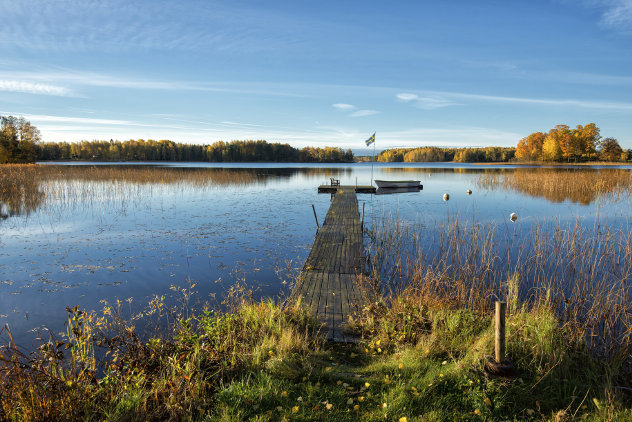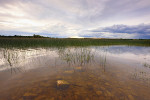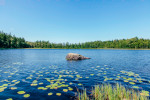The Swedish everyman's right (allemansrätten)
Lennart Beck, Friday, 29 June 2018

Swedish everyman's right (allemansrätten)
Nature means a lot to the Swedes. In Sweden you can freely access nature, even privately owned nature reserves. This is called everyman's right (allemansrätten). Everyman's right is an integral part of Swedish culture.
Allemansrätten regulates the relationship with nature, animals, and plants. This right indicates where, how and during which period one may stay in nature. It is not an official law but a customary law that came into being in the Middle Ages. Some parts of allemansrätten are laid down in formal laws, such as the law on hunting.
Rights and obligations
Everyman's right gives the inhabitants of Sweden and foreign visitors a great deal of freedom of movement in nature. But it also involves obligations. Anyone who does not comply with this can be punished.
Some parts of allemansrätten are a matter of interpretation. Therefore, if in doubt, it is advisable to ask the local authorities or landowners for an explanation.
Complying with rules and regulations
If you keep to the rules, treat nature carefully and do not cause any damage, then you can hardly do anything wrong.
Overview of the components of allemansrätten:
1. Land
You are not allowed to stay on the plot of land at a private residence, and you are also not allowed to cross the site. The same applies to agricultural land and tree plantations of young plants. In winter it is allowed to pass these parcels in case of frost and snow.
2. Camping
Camping is allowed in places that are not used for agricultural purposes and that are not close to a house. Camping is allowed for one night.
If you are traveling with more than two tents, you should contact the landowner. Even if it's only for one night,
3. Motorhomes and caravans
If you want to camp with a motorhome or caravan outside on official camping site, you have to park either directly on the road or a resting place (maximum 24 hours, also until the next working day at weekends). However, local regulations may prohibit this.
On private roads, especially near houses, you can only stay overnight with a motorhome or caravan in consultation with the landowner, even if it is just for one night. On some private roads, driving is wholly prohibited anyway (Pay attention to signs and barriers).
4. Waste
Do not leave any waste in nature. If you are camping in a place where there is already waste, take it with you. Then no one can say that the waste comes from you.
5. Motor vehicles
It is not allowed to drive motor vehicles in nature reserves.
However, many Swedes ignore this law ('terrängkörningslag') because they travel almost everywhere in nature with their quads ('fyrhjulingar'), their motocross motorcycles ('MC') and their snowmobiles ('snöscooter'). Resistance to this is increasing, however, so that there are zones now in northern Sweden where snowmobiles are no longer permitted.
Driving with motorized vehicles may also be prohibited on private roads. This is at the discretion of the owner. Pay attention to the signs.
6. Boats
If you are on the road with a boat (kayak, motorboat or sailboat), you can moor anywhere except near houses.
However, this permission does not apply to moorings, jetties, and beaches belonging to a dwelling or the area surrounding a home. So stay out of sight of the houses so as not to bother anyone.
If you want to stay at anchor for more than one night, ask the owner or landlord for permission.
Restrictions apply to military areas and bird sanctuaries.
7. Fire and firewood
Do not make a fire if the local authorities have imposed an "eldningsförbud" (fire ban). They do this in the event of a prolonged drought, usually in the period from March to June. The risk of forest fires is then high. If you are not sure, you can call the fire brigade ("räddningstjänsten").
In strong winds, you are not allowed to make a fire. The fire could spread.
Dry, broken branches can be taken with you as firewood.
When you leave, make sure that the fire is really extinguished. Pour a bucket of water over it.
8. Berries, flowers, and mushrooms
You can pick berries, mushrooms, and flowers. However, it is forbidden to excavate protected plants and take them with you.
Blue anemones ("blåsippor") and orchids are protected. You can make a bouquet of some preserved flowers for your use. Some plants are only regionally protected.
9. Fishing and hunting
Fishing and hunting is not allowed.. Almost all inland waterways require a fishing license ("fiskekort"). Without a fishing licence, you can fish in the five largest lakes: Mälaren, Vänern, Vättern, Hjälmaren, and Storsjön in Jämtland.
Fishing with a fishing net is not allowed, you can only fish with a fishing rod.
On the long Swedish coastline, you usually do not need a fishing license.
You may sit on a landing stage to fish, but you have to leave the landing stage if the owner wants to use it himself.
10. Dogs
Dogs must be kept on a leash between 1 March and 20 August, so that the game can raise its young in peace.
In principle, the leash is compulsory all year round, because even outside the period March-August a dog must be accompanied in such a way that he can not chase wild animals in nature.
Sweden rarely allows their dogs to walk freely in the wild. Also out of consideration for hikers.
11. Nature reserves
In general, special rules apply to nature reserves and national parks.
In nature reserves and national parks, all or part of the allemansrätten does not apply. Camping and cycling may also be prohibited here. Read the signs in these areas.

Swedish everyman's right (allemansrätten)
Nature means a lot to the Swedes. In Sweden you can freely access nature, even privately owned nature reserves. This is called everyman's right (allemansrätten). Everyman's right is an integral part of Swedish culture.
Allemansrätten regulates the relationship with nature, animals, and plants. This right indicates where, how and during which period one may stay in nature. It is not an official law but a customary law that came into being in the Middle Ages. Some parts of allemansrätten are laid down in formal laws, such as the law on hunting.
Rights and obligations
Everyman's right gives the inhabitants of Sweden and foreign visitors a great deal of freedom of movement in nature. But it also involves obligations. Anyone who does not comply with this can be punished.
Some parts of allemansrätten are a matter of interpretation. Therefore, if in doubt, it is advisable to ask the local authorities or landowners for an explanation.
Complying with rules and regulations
If you keep to the rules, treat nature carefully and do not cause any damage, then you can hardly do anything wrong.
Overview of the components of allemansrätten:
1. Land
You are not allowed to stay on the plot of land at a private residence, and you are also not allowed to cross the site. The same applies to agricultural land and tree plantations of young plants. In winter it is allowed to pass these parcels in case of frost and snow.
2. Camping
Camping is allowed in places that are not used for agricultural purposes and that are not close to a house. Camping is allowed for one night.
If you are traveling with more than two tents, you should contact the landowner. Even if it's only for one night,
3. Motorhomes and caravans
If you want to camp with a motorhome or caravan outside on official camping site, you have to park either directly on the road or a resting place (maximum 24 hours, also until the next working day at weekends). However, local regulations may prohibit this.
On private roads, especially near houses, you can only stay overnight with a motorhome or caravan in consultation with the landowner, even if it is just for one night. On some private roads, driving is wholly prohibited anyway (Pay attention to signs and barriers).
4. Waste
Do not leave any waste in nature. If you are camping in a place where there is already waste, take it with you. Then no one can say that the waste comes from you.
5. Motor vehicles
It is not allowed to drive motor vehicles in nature reserves.
However, many Swedes ignore this law ('terrängkörningslag') because they travel almost everywhere in nature with their quads ('fyrhjulingar'), their motocross motorcycles ('MC') and their snowmobiles ('snöscooter'). Resistance to this is increasing, however, so that there are zones now in northern Sweden where snowmobiles are no longer permitted.
Driving with motorized vehicles may also be prohibited on private roads. This is at the discretion of the owner. Pay attention to the signs.
6. Boats
If you are on the road with a boat (kayak, motorboat or sailboat), you can moor anywhere except near houses.
However, this permission does not apply to moorings, jetties, and beaches belonging to a dwelling or the area surrounding a home. So stay out of sight of the houses so as not to bother anyone.
If you want to stay at anchor for more than one night, ask the owner or landlord for permission.
Restrictions apply to military areas and bird sanctuaries.
7. Fire and firewood
Do not make a fire if the local authorities have imposed an "eldningsförbud" (fire ban). They do this in the event of a prolonged drought, usually in the period from March to June. The risk of forest fires is then high. If you are not sure, you can call the fire brigade ("räddningstjänsten").
In strong winds, you are not allowed to make a fire. The fire could spread.
Dry, broken branches can be taken with you as firewood.
When you leave, make sure that the fire is really extinguished. Pour a bucket of water over it.
8. Berries, flowers, and mushrooms
You can pick berries, mushrooms, and flowers. However, it is forbidden to excavate protected plants and take them with you.
Blue anemones ("blåsippor") and orchids are protected. You can make a bouquet of some preserved flowers for your use. Some plants are only regionally protected.
9. Fishing and hunting
Fishing and hunting is not allowed.. Almost all inland waterways require a fishing license ("fiskekort"). Without a fishing licence, you can fish in the five largest lakes: Mälaren, Vänern, Vättern, Hjälmaren, and Storsjön in Jämtland.
Fishing with a fishing net is not allowed, you can only fish with a fishing rod.
On the long Swedish coastline, you usually do not need a fishing license.
You may sit on a landing stage to fish, but you have to leave the landing stage if the owner wants to use it himself.
10. Dogs
Dogs must be kept on a leash between 1 March and 20 August, so that the game can raise its young in peace.
In principle, the leash is compulsory all year round, because even outside the period March-August a dog must be accompanied in such a way that he can not chase wild animals in nature.
Sweden rarely allows their dogs to walk freely in the wild. Also out of consideration for hikers.
11. Nature reserves
In general, special rules apply to nature reserves and national parks.
In nature reserves and national parks, all or part of the allemansrätten does not apply. Camping and cycling may also be prohibited here. Read the signs in these areas.

Search for houses and real estate in Sweden. Holiday homes and farms for sale in Sweden : Skåne, Blekinge, Halland, Kronoberg, Kalmar and Jönköping.
 Discover how foreigners can easily buy a holiday home in Sweden. Our article provides valuable tips on prerequisites, financing, taxes, insurance, and
the purchasing process. Let our helpful information guide you to your dream of a holiday home in Sweden - read now and be well prepared!
Discover how foreigners can easily buy a holiday home in Sweden. Our article provides valuable tips on prerequisites, financing, taxes, insurance, and
the purchasing process. Let our helpful information guide you to your dream of a holiday home in Sweden - read now and be well prepared!
More articles